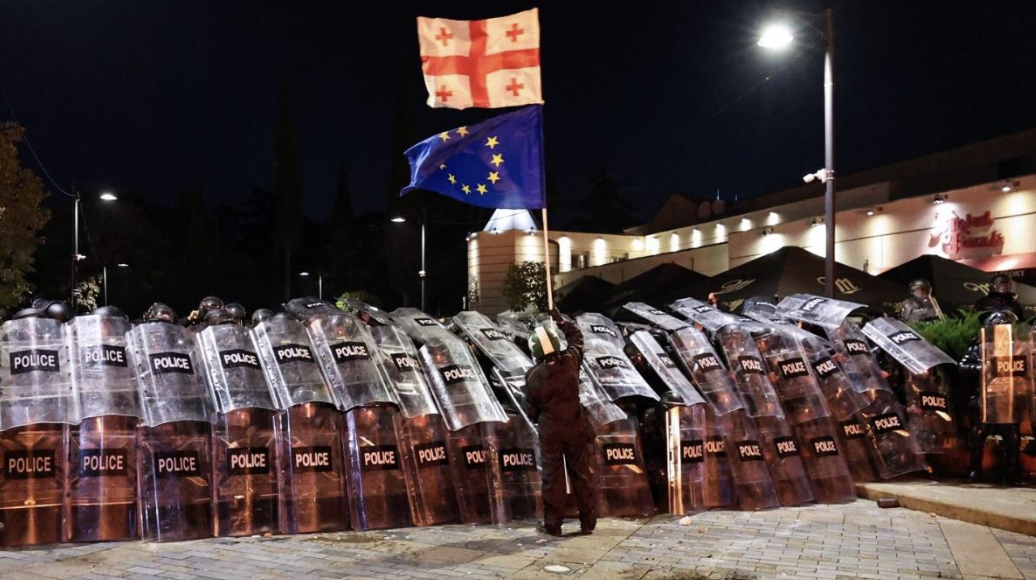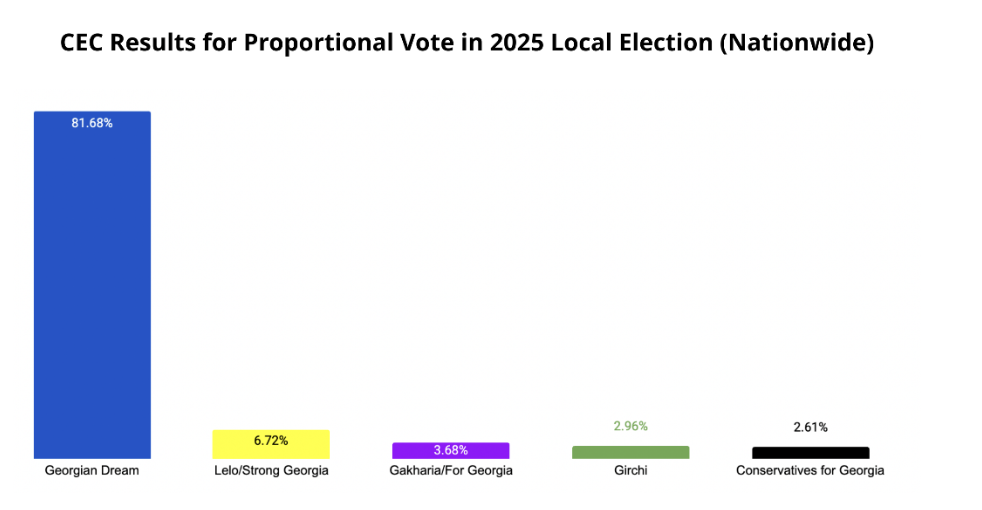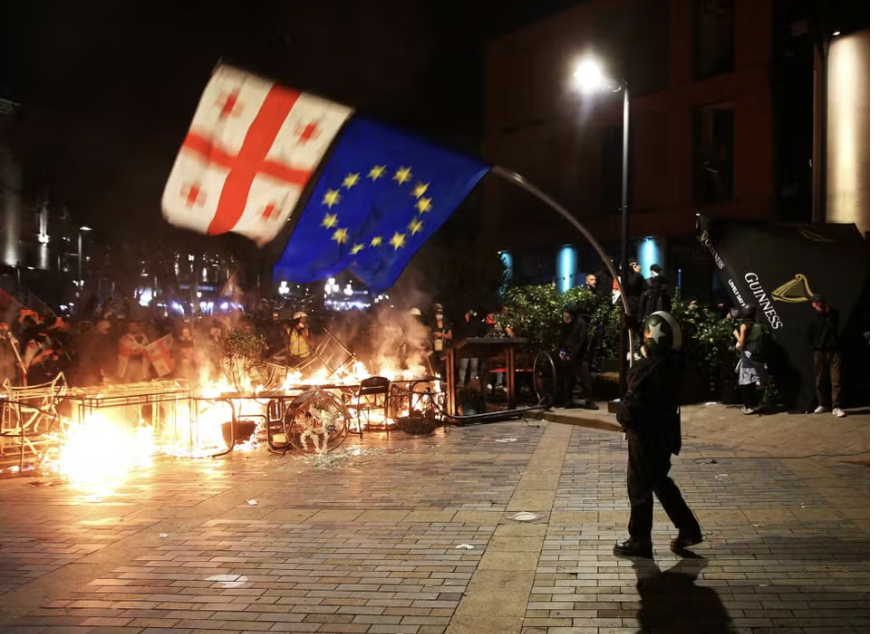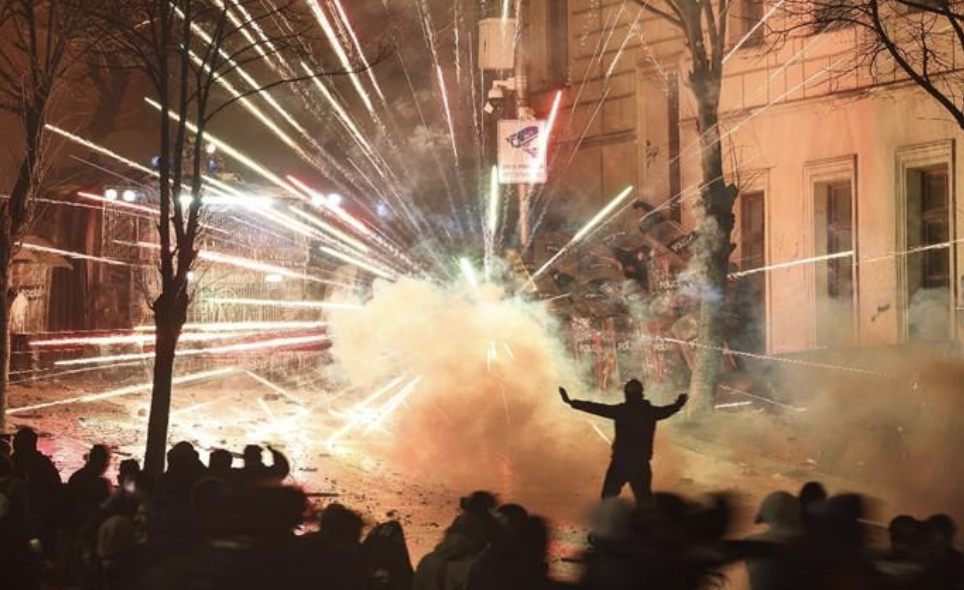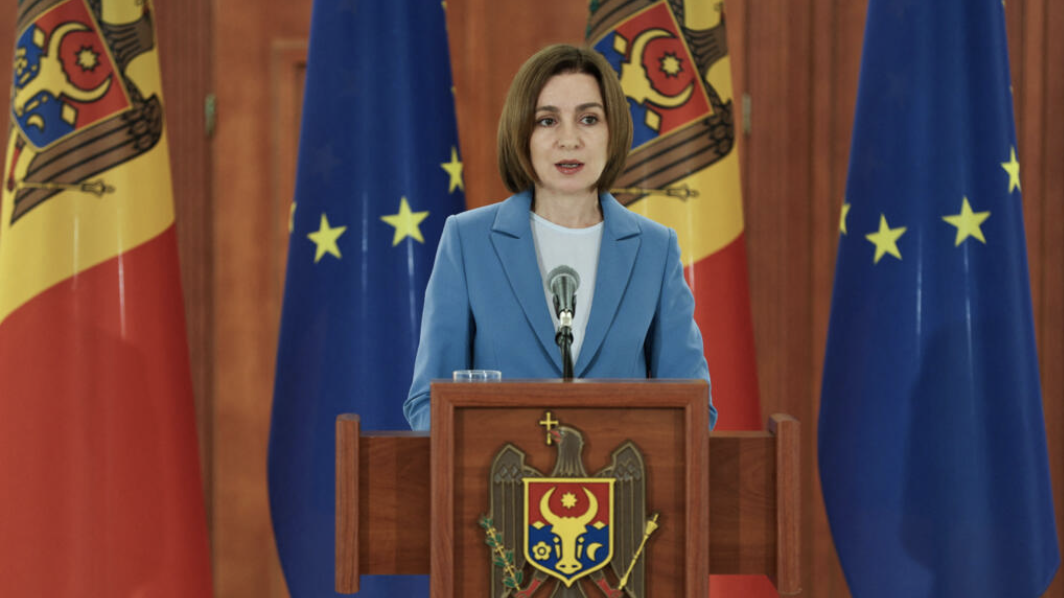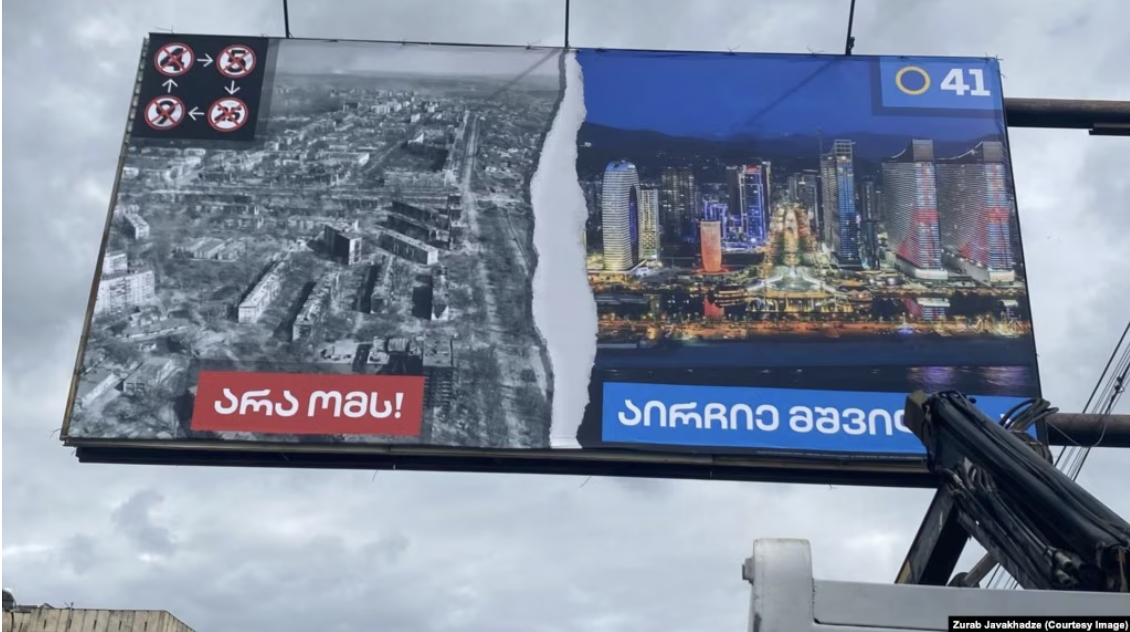People Against the ‘Machine’: How the Georgian Local Elections Solidified the Clash Between the Pro-Russian Ruling Party and the EU-Oriented Georgian Society
Written by: Nikola Kirkov, reading time: 11 minutes
A protester waves a Georgian and a European Union flags in front of riot police during an opposition rally on the day of local elections in central Tbilisi on October 4, 2025 (Giorgi Arjevanidze/AFP via Getty Images)
Four years ago, the European Union opened a door for three Eastern European states to pursue the long-dreamt goal of joining the alliance. The ‘Association Trio’, comprising Georgia, Moldova, and Ukraine, came together to sign a joint memorandum expressing their shared commitment to ‘cooperate to enhance their political association and economic integration with the EU.’ Four years later, the three former Soviet states are moving in polar opposite directions.
In the present day, Moldova celebrates a pro-EU victory in recent elections, and Ukraine actively pursues a future within the Union, despite the ongoing war. And then there is Georgia. A country on the crossroads between Russia and Europe, where protests have been ongoing since last year’s parliamentary election. The demonstrations and pressure from the EU have not been able to shake the Georgian Dream’s authoritarian and Kremlin-inspired chokehold on the country’s politics, which aims at realigning the country with Russia, of whose Soviet empire it once formed part.
Georgia’s 2025 Local Elections
On October 4, 2025, Georgia had its local government elections, in the backdrop of intense anti-governmental civil protests that had continued for over a year, and was marked by calls for a boycott from major opposition parties and allegations of vote rigging. Late into the evening of the same day, according to official results from the Georgian Central Election Commission, the Georgian Dream party unsurprisingly achieved an overwhelming victory. As announced by the Election Commission, the pro-Russian conservative party, which has been effectively ruling the South Caucasus country for the past 12 years, won in every city and municipality, including the capital Tbilisi, which traditionally leans more liberal than the rest of the country.
Source: Preliminary results by the Central Election Commission
With the major pro-Western opposition parties boycotting the elections and with another power-consolidating victory for the Georgian Dream despite traditions of alleged electoral fraud, tensions in the general public were at an all-time high. Voter turnout was unprecedentedly low - only 40.93% of people exercised their constitutional right to cast a ballot, down from 51.92% in the last local elections in 2021. While intimidation tactics and voter pressure were once again present during the elections, the Organisation for Security and Co-operation in Europe (OSCE), a major election watchdog, declined to monitor the vote due to a late invitation from the Georgian Dream party and called on the government to have ‘respect for the right to peaceful assembly’.
The situation reached a boiling point when thousands of anti-government protestors gathered on Rustaveli Avenue, the epicentre of major protests over the last two years, and took an unprecedented decision. The crowd of demonstrators headed for the presidential palace, where some protesters attempted to break into the palace, a move that was deemed by Georgia’s Interior Ministry as an illegal coup d'état and prompted a crackdown by riot police with water cannons and pepper spray. The violent response of Georgian authorities to disperse the protestors resulted in 21 hospitalised MIA officers and many injured civilians, according to Georgia’s health ministry. The authorities managed to detain five opposition members during the mass protests, claiming that it was on grounds of their ‘inciting governmental overthrow’.
A protester waves Georgian and EU flags in front of a burning barricade during an opposition rally on the day of local elections in Tbilisi, Georgia, October 4, 2025. IRAKLI GEDENIDZE / REUTERS
The incumbent Georgian Dream Prime Minister, Irakli Kobakhidze, announced that no mercy would be shown and threatened those who organised and took part in the unfolding demonstrations with severe consequences, while also blaming foreign intelligence agencies and the European Union for interference. On the following day, October 5, the deputy Interior Minister, Aleksandre Darakhvelidze, stated that organisers of the protests were arrested on charges of attempting to change the constitutional order through violence, facing up to nine years of imprisonment.
Following the events that unfolded on both days, in a joint statement, the European Union, while condemning the violence that occurred in the capital, reiterated its position on Georgian Dream’s political conduct by calling out the party for ensuring the fraudulent nature of the elections and for its fierce persecution of political opponents. Similarly, Kaja Kallas, the EU High Representative for Foreign Affairs and Security Policy, urged for peace and for the upholding of the right to freedom of assembly and expression by government authorities.
The Powderkeg of 2024 – How the ‘Revolution’ Began
This month’s attempted revolution by the Georgian people did not occur in a vacuum. The clash between protestors and riot police in front of the Presidential Palace came into fruition after months of Kremlin-style crackdowns and restrictions on civil society, prosecution of independent media, and the detention of dozens of opponents of the ruling party. Striking images of entire avenues and boulevards full to the brim with protestors draped in Georgian and EU flags were overflowing in European and international media in late 2024. Images reminiscent of a revolution fuelled by anger towards a ruling class which sold the future of its people in the name of personal benefits.
The Georgian parliamentary elections held on October 26, 2024, ignited the largest mass-scale protests in modern Georgian history. The Georgian Dream party declared victory on the night of the elections, with 54.3% of the vote according to the country's central electoral commission, despite reports of ballot stuffing, large-scale irregularities and Russian interference, prompting the opposition parties to contest the vote as fraudulent and rigged in favour of the pro-Kremlin party. While congratulations and supportive statements were flowing from a small circle of mostly authoritarian-leaning allies of Georgian Dream in Russia, Azerbaijan, and Hungary, reports by several international election observers caused an international outcry over the alleged widespread electoral manipulation. Joining the opposition, the previous pro-EU president of the country, Salome Zourabichvili, also refused to recognise the outcome of the elections, deciding to take part in mass demonstrations that had the aim of protecting the European future of Georgia.
Fireworks explode as protesters clash with police outside the parliament building during a demonstration against the government’s decision to delay EU membership talks. Photograph: AFP/Getty Images
With the protests spreading beyond Tbilisi to numerous other cities, reaching unparalleled proportions, the government authorities became increasingly hostile to demonstrators, resulting in the European Commission abruptly halting the process of Georgia's EU accession due to the actions of the Georgian government since the spring of 2024, on October 30. The adoption of a seemingly Kremlin-inspired foreign agents bill aimed at dismantling NGOs operating in Georgia and targeting civil society, sparking mass-scale anti-government riots in early 2024, additionally contributed to the EU accession standstill despite the decision of the European Council to grant candidate status to Georgia in December 2023. Georgia applied to be part of the EU in March 2022, while the goal of joining the Union has been enshrined in Georgia’s Constitution since 2017.
The fear of the Georgian people that the country was steering to Moscow finally came into fruition on November 24 2024, when Prime Minister Irakli Kobakhidze, leader of the Georgian Dream party together with its founder, oligarch Bidzina Ivanishvili, made the executive decision to postpone Georgia's EU accession talks until 2028, causing severe escalation with the fiercest wave of pushbacks yet breaking out. The move could be described as a direct affront to Georgia’s longstanding aspiration for European integration, a goal supported by a substantial majority of the population. The response of the Georgian authorities was anything but timid, with levels of police brutality against protesting civilians similar to those of Berkut police forces Europe witnessed in 2014 during the Revolution of Dignity (EuroMaidan protests).
Georgia's Prime Minister Irakli Kobakhidze attends a news conference in Tbilisi, Georgia Nov. 28, 2024. (Reuters Photo)
Alongside the unequivocal detention of opponents and the continuous authoritarian lawmaking tendencies of the Georgian Dream party, the crackdown ensured the protests’ continuation to the present day, prompting the Human Rights Watch to label Georgia as a country suffering a ‘rights crisis.’
Russian Destabilisation in the Former Soviet Bloc
The Georgian civil crisis is not the first instance in which a country from the former Soviet bloc has been steadily pushed back into the sphere of its previous emperor. In its entirety, the events in Georgia, which have been unfolding for over a year, point to interference from the Russian Federation. Moscow utilised the prominent political role of the oligarch Bidzina Ivanishvili, Georgia’s richest man with a fortune amassed in Russia during the 1990s, who handed over the country’s infrastructure to China and its political direction to Russia, aiming at securing its firm influence over the country, previously on a path towards integration with the EU and the West. Russia has been guilty of trying to implement similar tactics in other Eastern European states.
Georgia’s shift away from its pro-EU stance intensified when the country made a formal application for EU membership alongside Ukraine and Moldova in early 2022. Conversely, Moldova has managed to successfully circumvent Russian meddling. On September 28, 2025, the country was headed for its parliamentary elections, against the backdrop of a premeditated and skilfully orchestrated destabilisation campaign. The Kremlin pumped hundreds of millions of euros into defeating the pro-EU ruling party PAS (Party for Action and Solidarity), as stated by President Sandu herself. An investment that it hoped would ensure Moldova’s undemocratic return to its sphere of influence and halt its EU momentum. An investment that manifested in disruption attempts via outright vote-buying, intense information warfare on social media, and cyberattacks. A BBC undercover investigation uncovered a network linked to pro-Russian fugitive oligarch Ilan Shor and the sanctioned NGO Evrazia, which paid civilians to spread pro-Russian propaganda and fake news ahead of the election to undermine the pro-EU government. Recruits were trained via secret online seminars to create disinformation posts using ChatGPT and were paid through a sanctioned Russian bank tied to Russia’s defence ministry.
Despite having to fight the exponential interference from the Kremlin, the governing party, PAS, led by Sandu, came out victorious, defeating Russian-backed parties and securing a parliamentary majority that would drive the advancement of the country’s EU accession talks. The same cannot be said for Georgia, however, where the ruling party is the main source of Russia-inspired talking points.
Moldovan President Maia Sandu attends a press conference following the announcement of parliamentary elections results, in Chisinau, Moldova 29 September, 2025. © REUTERS - Vladislav Culiomza
Heading towards the vital 2024 parliamentary elections, fear-mongering billboards appeared in all parts of Georgia, as well as posts on social media, part of a mass-scale advertising campaign launched by the Georgian Dream party. The main feature of the campaign was the use of imagery from war-torn cities in Ukraine destroyed by Russia, juxtaposed with photographs of peaceful Georgian cities. The main message was one of false narratives pushed by the governing party, claiming that the opposition and the EU were trying to hijack Georgia and push it into war with Russia. Similar narratives are spread by the Kremlin as a smear campaign against the West, despite the Russian military-industrial complex not possessing the means of opening a front against another country.
A billboard for the ruling Georgian Dream party in downtown Tbilisi. Underneath the left image, the text says "No war." On the right side, the text says "Choose peace.", Zurab Javakhadze (Reuters Photo)
More baffling rhetoric, which constitutes an example of Russian interference, is the one spread by Bidzina Ivanishvili in regards to Abkhazia and South Ossetia. The messages aimed at convincing the public that cosying up with Russia is the way to go reached a breaking point when Ivanishvili suggested that the country should apologise for the Russo-Georgian war of 2008, blaming the previous ruling party, which now stays in opposition, for Russia’s invasion of the country. This reckless move sparked an outcry in Georgian society, mainly from those who had lost relatives in the five-day war. Georgia’s northern border regions of Abkhazia and South Ossetia, representing 20% of the country’s territory, have been occupied by Russia since 2008.
Despite using EU flags in its campaign and calling for joining Europe ‘with dignity’, Georgian Dream has been weaponising state-controlled media in a Kremlin-style, to portray the EU and NATO as failing institutions and to frighten citizens about EU membership with narratives of “LGBT dictatorship”, framing Western integration as a threat to Georgia’s Christian identity. Recently, Georgian Dream passed Kremlin-style anti-LBGTQ laws, directly going against EU discrimination guidelines, and suggested banning opposition parties – steps which would inevitably result in the derailing of Georgia’s EU accession.
The Question of Georgia’s Future
And while water cannons are penetrating crowds demanding freedom and the teeth-grinding sound of riot police metal batons slamming against protestors’ heads echoes throughout Rustaveli avenue, the EU future of Georgia remains uncertain. Will the Georgians’ undying will to be a part of Europe be strong enough to break the chains of the consolidated power of the pro-Russian ruling class? Will the country’s decline into Russian-style authoritarianism result in it becoming fully a fragment of Moscow’s sphere of influence? Will tsarists remain the owners of a country, of a people, of an entire nation?
